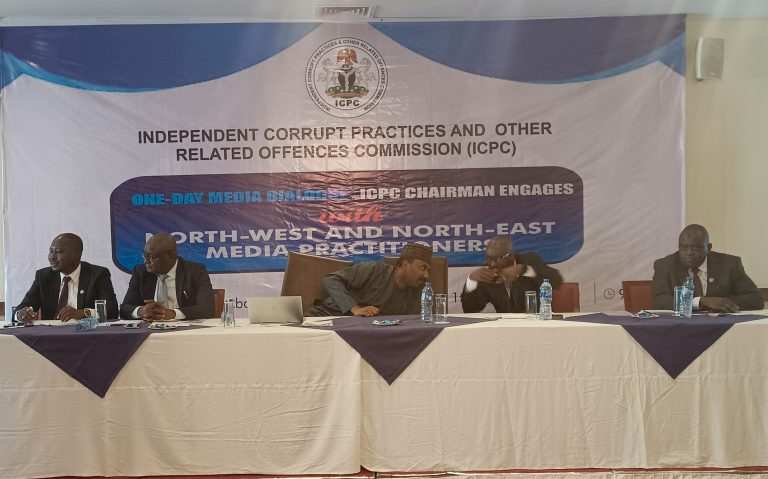The Independent Corrupt Practices and Other Related Offences Commission (ICPC) has reported a significant recovery of public funds totaling approximately ₦50.6 billion and $1.066 million from the North-West and North-East geopolitical zones of Nigeria between May 2023 and July 2025, reinforcing its commitment to combating corruption and ensuring accountability in these regions.
According to a detailed report presented at a media engagement attended by select journalists from the Northwest and the Northeast and held at the Bristol Hotel in Kano, the ICPC tracked a total of 1,440 public projects valued at about ₦271.054 billion, with 767 projects worth ₦112.737 billion in the Northeast and 673 projects worth ₦158.317 billion in the Northwest. Citizens and journalists played a pivotal role in flagging abandoned and mismanaged projects, facilitating vital interventions that helped redirect resources to their intended beneficiaries.
The Commission’s efforts led to cash recoveries of ₦7.269 billion in the Northwest and ₦43.335 million in the Northeast, alongside the recovery of $1.066 million in the Northwest. Beyond cash, tangible assets were also seized, including 14 buildings, 25 plots of land, and three farmlands in the Northwest, signaling a robust reclaiming of state resources.
The legal facet of the ICPC’s work included the investigation of 171 corruption cases, of which 117 were in the Northwest and 54 in the Northeast. This culminated in 15 cases being filed in court, nine from the Northwest and six from the Northeast, resulting in four convictions recorded in the Northwest zone.
At the heart of its strategy to curtail corruption, the ICPC emphasised public enlightenment and sensitisation campaigns. Over the last two years, the Commission conducted 311 sensitisation sessions reaching 229,632 individuals—151,450 in the Northwest and 78,182 in the Northeast—and established 142 anti-corruption clubs across secondary schools and tertiary institutions to nurture a culture of integrity among the youth.
“These recoveries and interventions are not just statistics; they represent the courage and resilience of ordinary Nigerians who refuse to succumb to corruption,” said Dr. Musa Adamu Aliyu SAN, Chairman of the ICPC, during his speech at the engagement. He highlighted that the North-West recorded the highest bribe refusal rate in the country at 76%, while the North-East recorded 60%, demonstrating the public’s growing commitment to standing against corrupt practices.
The Chairman also underscored the increasing incidence of corruption reporting in these regions, which rose from 4.7% in 2019 to 13.4% in 2023, with reports leading to formal actions nearly tripling during the same period. He illustrated the impact with stories of a trader in the Northwest refusing to pay bribes for business permits and a nursing mother in an IDP camp in the Northeast reporting aid diversion, empowered by knowledge of the ICPC’s successes.
Looking ahead, the ICPC outlined a multi-pronged approach to deepen its impact, including stronger collaboration with community leaders, expanding field monitoring, leveraging technology for better oversight, and continuous capacity building for stakeholders involved in financial forensics and procurement monitoring.
Dr. Aliyu called on the National Assembly to expedite the passage of the Whistleblower Bill, enabling citizens to report corruption without fear, and appealed to the media to support the fight against corruption through investigative journalism that holds leaders accountable while maintaining public trust.
The ICPC’s work in the North-West and North-East is not merely about governance but also a critical element in peacebuilding, trust restoration, and development in regions that have faced insecurity and humanitarian challenges. As Dr. Aliyu concluded, “Together, from resistance to results, we can make corruption the exception—not the rule—in our great country.”
This latest report underscores the ICPC’s dedication to enforcing the pillars of enforcement, prevention, and public education in its ongoing mission to safeguard public resources and empower Nigerians in the fight against corruption.


